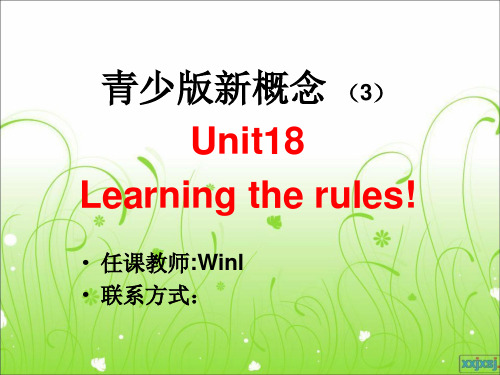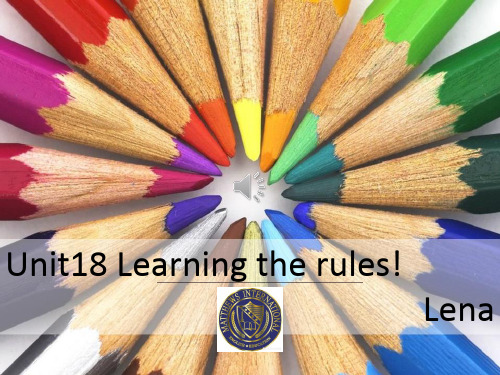新概念英语青少版3B Unit 18
- 格式:ppt
- 大小:4.56 MB
- 文档页数:5





新概念英语第三册第18课:Electric currents in modern artLesson 18 Electric currents in modern art 现代艺术中的电流 Listen to the tape then answer the question below.听录音,然后回答以下问题。
How might some of the exhibits have been dangerous?Modern sculpture rarely surprises us any more. The idea that modern art can only be seen in museums is mistaken. Even people who take no interest in art cannot have failed to notice examples of modern sculpture on display in public places. Strange forms stand in gardens, and outside buildings and shops. We have got quite used to them. Some so-called 'modern' pieces have been on display for nearly eighty years.In spite of this, some people -- including myself -- were surprise by a recent exhibition of modern sculpture. The first thing I saw when I entered the art gallery was a notice which said: 'Do not touch the exhibits. Some of them are dangerous!' The objects on display were pieces of moving sculpture. Oddly shaped forms that are suspended form the ceiling and move in response to a gust of wind are quite familiar to everybody. These objects, however, were different. Lined up against the wall, there were long thin wires attached to metal spheres. The spheres had been magnetized and attracted or repelled each other all the time. In the centre of the hall, there were a number of tall structures which contained coloured lights. These lights flickered continuously like traffic lights which have gone mad. Sparks were emitted from small black boxes and red lamps flashed on and off angrily. It was rather like an exhibition of prehistoric electronic equipment. These peculiar forms not only seemed designed to shock people emotionally, but to give them electric shocks as well! 参考译文现代雕塑不再使我们感到惊讶了。

新概念英语第三册第18课:Electric currents in modern artLesson 18 Electric currents in modern art 现代艺术中的电流 Listen to the tape then answer the question below.听录音,然后回答以下问题。
How might some of the exhibits have been dangerous?Modern sculpture rarely surprises us any more. The idea that modern art can only be seen in museums is mistaken. Even people who take no interest in art cannot have failed to notice examples of modern sculpture on display in public places. Strange forms stand in gardens, and outside buildings and shops. We have got quite used to them. Some so-called 'modern' pieces have been on display for nearly eighty years.In spite of this, some people -- including myself -- were surprise by a recent exhibition of modern sculpture. The first thing I saw when I entered the art gallery was a notice which said: 'Do not touch the exhibits. Some of them are dangerous!' The objects on display were pieces of moving sculpture. Oddly shaped forms that are suspended form the ceiling and move in response to a gust of wind are quite familiar to everybody. These objects, however, were different. Lined up against the wall, there were long thin wires attached to metal spheres. The spheres had been magnetized and attracted or repelled each other all the time. In the centre of the hall, there were a number of tall structures which contained coloured lights. These lights flickered continuously like traffic lights which have gone mad. Sparks were emitted from small black boxes and red lamps flashed on and off angrily. It was rather like an exhibition of prehistoric electronic equipment. These peculiar forms not only seemed designed to shock people emotionally, but to give them electric shocks as well! 参考译文现代雕塑不再使我们感到惊讶了。
---------------------------------------------------------------最新资料推荐------------------------------------------------------青少版新概念2B unit18Unit 18Read the label !看标签!1/ 25Did ken install a telephone?Did the baby cuckoo eat the other eggs? What appeared in his garden last spring? When did the young cuckoo hatch? Who watched excitedly? The show was over,wasn’t?---------------------------------------------------------------最新资料推荐------------------------------------------------------ ? label [ ‘leib?l] n. 标签 ? lunchbox [‘l?nt?b?ks] n. 午餐饭盒 ? stuff [st?f] n. 东西 ? chemistry [‘kemistri] n. 化学;化学药品 ? plane [plein] n. 飞机 ? miss [mis] v. 错过 ? discover [dis‘k?v?] v. 发现 ? anyway [‘eniwei] adv. 无论如何 ? honestly [‘?nistli] adv. 诚实地 ? at the same time 同时 ? Yuk! [j?k] 呸!3/ 25? practice n. 练习 ? enough adj. 足够的 ? Happened---happen 的过去式 v. 发生 ? gave ----give的过去式 v. 给 ? Went---go 的过去式 v. 去 ? felt---feel 的过去式 v. 感觉 ? sick adj. 恶心 ? A bit----a little 一点儿 ? needed---need的过去式 v. 需要 ? ate—eat的过去式 v. 吃 ? One after another 一个接一个---------------------------------------------------------------最新资料推荐------------------------------------------------------ labelmissaboutpracticeanyway stuffplaneYuk5/ 25标签 1发现 2飞机 1化学 3 同时 3错过 1诚实的 2东西 1---------------------------------------------------------------最新资料推荐------------------------------------------------------ Listening to the recording, and then answer this question:Q1:Why did Vikki miss breakfast that morning?Because she did her piano practice before school.Q2:When did Vikki feel really sick?She felt really sick after She ate four Crispy Trolls.7/ 25Lucy1.VikkiOne of these is a student. Some of these are students.Lucy: Do you want one of these, Vikki? (一般现在时)Vikki: No, thanks!I ate some of those about a year ago.Once was enough!固定短语,“一次就够了!”---------------------------------------------------------------最新资料推荐------------------------------------------------------ 2、时间状语Lucy: Why? What happened?放动词短语之后Vikki: I missed breakfast that morning,because I did my piano practice before school./t/Mum gave me my lunchbox,and I went for the bus.表目的双宾语动词短语9/ 253、一般地点状语放在句首表介绍场景,讲述的顺序Vikki: On the school busI felt a bit sick.原形:feel 频率副词常放句末表“概括” 事情就是这样I always feel sick on buses,anyway.(一般现在时表永恒的事实)---------------------------------------------------------------最新资料推荐------------------------------------------------------ 4、need (sb.) to do sth. e.g: I need you to help me.Vikki: I needed to eat something. I looked in my lunchbox and discovered the Crispy trolls.11/ 255、Vikki: I ate four Crispy trolls, one after another.原形:eat固定短语:一个接一个地吃过去式:/red/At the same time I read the label on the packet.固定短语:同时---------------------------------------------------------------最新资料推荐------------------------------------------------------ 6、“厌恶”(感叹词)强调“sick”Vikki: Then I felt really sick! Yuk!Believe meHonestly, Lucy, this stuff isn’t food.It’s chemistry. Read the label.13/ 25LUCY: Do you want one of these,Vikki? VIKKI: No, thanks ! I ate some of those about a year ago . Once was enough ! LUCY: Why?What happened? VIKKI:I ate breakfast that morning, because I did my piano practice before school. Mum gave me my lunchbox, and I went for the bus. VIKKI:On the school bus I felt a bit sick.I always feel sick on buses, anyway .---------------------------------------------------------------最新资料推荐------------------------------------------------------ VIKKI:I needed to eat something. I looked in my lunchbox and discovered the Crispy Trolls.VIKKI:I ate four Crispy Trolls. one after another. At the same time I read the label on the packet. VIKKI: Then I felt really sick!Yuk! Honestly Lucy, this stuff isn’t food. It’s chemistry. Read the label!15/ 25UNIT 18LESSON 36---------------------------------------------------------------最新资料推荐------------------------------------------------------ pronunciation /ps/chops perhaps chips tips keeps/ts/parts waits cats carrots bats17/ 25pronunciation /ks/box six fox fix/sp/crisp gossip---------------------------------------------------------------最新资料推荐------------------------------------------------------ pronunciation /st/waste best must rest/sk/ask desk19/ 25sellv. 卖,出售library n. 图书馆 page n.页chemical n. 化学物品 fortnight n.两个周 Pairs n.巴黎---------------------------------------------------------------最新资料推荐------------------------------------------------------ InfinitiveSimple pastbuy----bought come----came do----did drive----drove eat----ate feel----felt fly----flew have----had21/ 25Infinitive Simple pastgo----went put----put read/ri:d/--read/red/ ride----rode see----saw sell----sold sit----sat---------------------------------------------------------------最新资料推荐------------------------------------------------------ boughtcame felt readdid flew sawdroveatewentput satsoldrodehad23/ 25sat in the garden (yesterday) ate an apple①Whatdid Ken do yesterday? did Ken sit in the garden?He sat in the garden and ate an apple.②WhenHe sat in the garden yesterday.①DidKen sit in the garden yesterday and eat an apple? you sit in the garden yesterday?Yes, he did.②DidYes, I did. I sat in the garden and ate an apple.---------------------------------------------------------------最新资料推荐------------------------------------------------------ Homework:1、完成第一部分的听读复习并签字;2、背诵单词(5个);3、复习P22内容并完成书面作业;25/ 25。
Unit 18 Read the label! 看标签!一、重点单词及拓展:1. miss的用法1) 未击中;未得到;错过例:He threw the ball to me, but I missed it. 他把球扔给我,但我没接住。
I was late because I missed the bus. 我迟到了,因为我错过了公共汽车。
2)逃过;避开例:I was lucky to miss the traffic accident. 我很幸运躲过了车祸。
3)丢失例:When did you miss your pen? 你什么时候丢的钢笔?4)怀念;思念例:I'm sure that everybody will miss him very much. 我相信每个人都会怀念他。
注意:Miss表示未婚女性;年轻女教师missing既是miss的现在分词形式,也是形容词,表示丢失的,迷路了。
例:My marker was missing. 我的笔找不到了。
2.do + 名词/动名词的用法,可以代替单独的动词do my piano practice 练钢琴do some reading 做一些阅读do cleaning 打扫卫生do washing 洗衣服注意:这类短语要与go + 动名词短语区分开,如go shopping/swimming/fishing等也是固定用法,它们表示“去做......”。
造句练习1:1)快点,否则(or)你会错过公交车。
2)Tom,你怎么了?我丢了我的英语书。
3)晚饭后,我会和妈妈一起做一些阅读。
3.once的用法1)副词,一次;一遍;一倍例:We go to the pany once a day. 我们一天去公司一次。
He read this text only once yesterday. 这个课文他昨天只读了一遍。
2)副词,曾经;一度(常用于一般过去时)例:Once he learned some English. 他曾经学过一点英语。